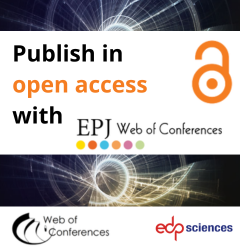Conférences > Physique > Astronomie, astrophysique et cosmologie
Sélecionner un pays
Virtuel (en ligne) (1) - Allemagne (11) - Arménie (1) - Australie (1) - Autriche (1) - Brésil (4) - Canada (1) - Corée du Sud (1) - Croatie (1) - Espagne (4) - France (3) - Grèce (2) - Irlande (1) - Italie (14) - Japon (4) - Mexique (2) - Pologne (5) - Portugal (1) - Pérou (1) - Royaume-Uni (2) - République tchèque (1) - Suisse (1) - États-Unis (15)
TOUS LES PAYS (78)
1
“Some Like It Hot!” A Journey from the Hot IGrM to the Multiphase CGM
22 avr 2024 - 17 mai 2024 • Garching, Allemagne
Identifiant de l'évènement:
1557542
2
Teachers' Conference — Supermassive Black Holes and their Destructive Tidal Forces
24 avr 2024 - 27 avr 2024 • Santa Barbara, États-Unis
Identifiant de l'évènement:
1590201
3
AbSciCon 2024
05 mai 2024 - 10 mai 2024 • Providence, Rhode Island, États-Unis
Identifiant de l'évènement:
1530863
4
Loops 24
06 mai 2024 - 10 mai 2024 • Florida Atlantic University, Fort Lauderdale, Florida, États-Unis
Identifiant de l'évènement:
1517602
Page web:
5
Alps I — Advanced Lectures in Physics in Switzerland: Quantum information, from gravity to computers and back
12 mai 2024 - 17 mai 2024 • Les Diablerets, Suisse
Identifiant de l'évènement:
1592464
6
Gravitational Wave Advanced Detector Workshop 2024
12 mai 2024 - 18 mai 2024 • Hamilton Island , Australie
Date limite de soumission des résumés:
28 jan 2024
Identifiant de l'évènement:
1592509
Page web:
7
Minicourse on non-perturbative methods in QCD, quantum gravity and cosmology
13 mai 2024 - 31 mai 2024 • São Paulo, Brésil
Identifiant de l'évènement:
1600511
8
Speakable and Unspeakable in Quantum Gravity
13 mai 2024 - 31 mai 2024 • Saclay, France
Identifiant de l'évènement:
1602804
9
IWM-EC 2024 — International Workshop on Multi facets of Equation of state and Clustering
21 mai 2024 - 24 mai 2024 • Catania, Italie
Identifiant de l'évènement:
1568185
Page web:
10
Habitability: The Astrophysical, Atmospheric and Geophysical Implications
21 mai 2024 - 14 jui 2024 • Garching, Allemagne
Identifiant de l'évènement:
1557629
Page web:
11
Lecture Sequence on Astronomy and Astrophysics
25 mai 2024 - 30 mai 2024 • Online, Virtuel (en ligne)
Identifiant de l'évènement:
1605049
12
Standard cosmology at the threshold of change?
03 jui 2024 - 06 jui 2024 • Thessaloniki, Grèce
Identifiant de l'évènement:
1606821
Page web:
13
Cosmic Signals of Dark Matter Physics: New Synergies
03 jui 2024 - 06 jui 2024 • Santa Barbara, États-Unis
Identifiant de l'évènement:
1519942
14
2024 Kudowa Summer School — 17th Kudowa Summer School
03 jui 2024 - 07 jui 2024 • Kudowa Zdroj, Pologne
Identifiant de l'évènement:
1594491
Page web:
15
244th AAS Meeting — 244th meeting of the American Astronomical Society
09 jui 2024 - 13 jui 2024 • Madison, WI, États-Unis
Identifiant de l'évènement:
1553687
16
Black-Hole Microstructure VI
10 jui 2024 - 14 jui 2024 • IPhT, CEA Saclay, France
Identifiant de l'évènement:
1580490
Page web:
17
XIV Torino Workshop on AGB stars
10 jui 2024 - 14 jui 2024 • INAF - Observatory of Rome, Italie
Identifiant de l'évènement:
1564604
Page web:
18
SPIE Astronomical Telescopes + Instrumentation
15 jui 2024 - 20 jui 2024 • Yokohama , Japon
Identifiant de l'évènement:
1565181
19
SPIE AS24 — SPIE Astronomical Telescopes + Instrumentation 2024
16 jui 2024 - 21 jui 2024 • Yokohama, Japon
Identifiant de l'évènement:
1579611
Page web:
20
CFT and Holography for Heavy and Thermal States and Black Holes
17 jui 2024 - 21 jui 2024 • Trinity College, Dublin, Irlande
Identifiant de l'évènement:
1615068
21
Summer School on Cosmology
17 jui 2024 - 28 jui 2024 • ICTP, Trieste, Italie
Identifiant de l'évènement:
1581250
Page web:
22
Quantum Aspects of Inflationary Cosmology
24 jui 2024 - 19 jul 2024 • Garching, Allemagne
Identifiant de l'évènement:
1557639
23
Workshop — Neutrino Frontiers
25 jui 2024 - 19 jul 2024 • Firenze , Italie
Identifiant de l'évènement:
1565422
24
S10 EAS2024 — Supernovae: now in 3D! @ the EAS2024
01 jul 2024 - 02 jul 2024 • PAdua, Italie
Identifiant de l'évènement:
1606977
25
DPG-Lehrerfortbildung — Astronomie
01 jul 2024 - 05 jul 2024 • Physikzentrum Bad Honnef, Allemagne
Identifiant de l'évènement:
1602147
26
MG17-2024 — 17th Marcel Grossmann Meeting on General Relativity
07 jul 2024 - 12 jul 2024 • Pescara, Italie
Identifiant de l'évènement:
1611240
Page web:
27
ML4ASTRO2 — International Conference on Machine Learning for Astrophysics
08 jul 2024 - 12 jul 2024 • Catania, Italie
Date limite de soumission des résumés:
10 avr 2024
Identifiant de l'évènement:
1613025
Page web:
28
ISVHECRI 2024 — 22th International Symposium on Very High Energy Cosmic Ray Interactions
08 jul 2024 - 12 jul 2024 • Puerto Vallarta, Mexique
Identifiant de l'évènement:
1579610
Page web:
29
CosmoVerse@Krakow
09 jul 2024 - 11 jul 2024 • Cracovie, Pologne
Identifiant de l'évènement:
1596751
30
45th COSPAR Scientific Assembly and Associated Events
13 jul 2024 - 21 jul 2024 • Busan, Corée du Sud
Identifiant de l'évènement:
1553626
Page web:
31
My Favourite Dark Matter Model
22 jul 2024 - 26 jul 2024 • Ponta Delgada, Portugal
Identifiant de l'évènement:
1616082
Page web:
32
Cosmological History: from Gravitational Waves to Exoplanets
29 jul 2024 - 09 aou 2024 • São Paulo, Brésil
Identifiant de l'évènement:
1600452
33
Mathematical Aspects of General Relativity
04 aou 2024 - 09 aou 2024 • Oberwolfach, Allemagne
Identifiant de l'évènement:
1529786
Page web:
34
Multi-messenger Transients — Multi-messenger Transients from Binary Mergers & Stellar Explosions
04 aou 2024 - 25 aou 2024 • Aspen, Colorado, États-Unis
Identifiant de l'évènement:
1583298
35
Rise_Time: Explosive Astrophysics in the era of High-Cadence Astronomy
07 aou 2024 - 09 aou 2024 • West Lafayette, Indiana, États-Unis
Identifiant de l'évènement:
1583498
36
Optimal Transport and Dynamics
11 aou 2024 - 16 aou 2024 • Oaxaca, Mexique
Identifiant de l'évènement:
1576737
37
MODEST-24 — Exploring Dense Stellar Systems Across Cosmic Time
19 aou 2024 - 23 aou 2024 • Varsovie, Pologne
Identifiant de l'évènement:
1600143
Page web:
38
The BRITE Side of Stars
20 aou 2024 - 23 aou 2024 • Vienne, Autriche
Identifiant de l'évènement:
1604112
Page web:
39
Cosmic Dawn Revealed by JWST: The Physics of the First Stars, Galaxies, and Black Holes
26 aou 2024 - 29 aou 2024 • UC Santa Barbara, États-Unis
Identifiant de l'évènement:
1565330
40
Strong and Electro-Weak Matter 2024
26 aou 2024 - 30 aou 2024 • Frankfurt am Main, Allemagne
Identifiant de l'évènement:
1614253
41
Eurostrings 2024
02 sep 2024 - 06 sep 2024 • Southampton, Royaume-Uni
Identifiant de l'évènement:
1614930
Page web:
42
Fundamental Physics UK
02 sep 2024 - 06 sep 2024 • Southampton, Royaume-Uni
Identifiant de l'évènement:
1615006
Page web:
43
IWARA2024 — 11TH INTERNATIONAL WORKSHOP ON ASTRONOMY AND RELATIVISTIC ASTROPHYSICS
02 sep 2024 - 06 sep 2024 • MACHUPICCHU PUEBLO (AGUAS CALIENTES), Pérou
Identifiant de l'évènement:
1611230
Page web:
44
Advanced school on quantum spacetime
02 sep 2024 - 06 sep 2024 • Varsovie, Pologne
Identifiant de l'évènement:
1614943
Page web:
45
NOW 2024 — Neutrino Oscillation Workshop 2024
02 sep 2024 - 08 sep 2024 • Otranto (Lecce), Italie
Identifiant de l'évènement:
1614669
Page web:
46
Nuclear Physics in Astrophysics School
08 sep 2024 - 15 sep 2024 • Burg Stolpen, Allemagne
Identifiant de l'évènement:
1614299
Page web:
47
Galactic and extragalactic X-ray transients, theory and observational perspectives
09 sep 2024 - 11 sep 2024 • Varsovie, Pologne
Identifiant de l'évènement:
1608962
Page web:
48
XLXI International Meeting on Fundamental Physics
09 sep 2024 - 13 sep 2024 • Benasque , Espagne
Identifiant de l'évènement:
1588938
49
ESPM-17 — 17th European Solar Physics Meeting
09 sep 2024 - 13 sep 2024 • Turin, Italie
Identifiant de l'évènement:
1596879
Page web:
50
High-Energy Plasma Phenomena in Astrophysics
09 sep 2024 - 20 sep 2024 • Garching, Allemagne
Identifiant de l'évènement:
1557614
51
NPA-XI — Nuclear Physics in Astrophysics XI
15 sep 2024 - 20 sep 2024 • Dresden, Allemagne
Identifiant de l'évènement:
1529421
Page web:
52
WE Heraeus-EAS Early Career Researchers in Astronomy Workshop — The Nature and the Dynamics of Structures Observed in Galactic Disks
15 sep 2024 - 20 sep 2024 • Athènes , Grèce
Identifiant de l'évènement:
1602034
53
The Fundamentals: Summer school in high-energy and gravitational physics
16 sep 2024 - 21 sep 2024 • Split, Croatie
Identifiant de l'évènement:
1614999
54
45th Course of the International School/Workshop of Nuclear Physics: "Nuclei in the laboratory and in stars"
16 sep 2024 - 22 sep 2024 • Erice, Italie
Identifiant de l'évènement:
1614193
55
CSS2024 — Cosmology on Small Scales 2024: Local Hubble Expansion and Other Cosmological Puzzles
19 sep 2024 - 21 sep 2024 • Prague, République tchèque
Identifiant de l'évènement:
1604887
Page web:
56
Witnessing Quantum Aspects of Gravity in a Lab
23 sep 2024 - 27 sep 2024 • São Paulo, Brésil
Identifiant de l'évènement:
1600637
57
RICAP-2024 — Roma International Conference on Astroparticle Physics
23 sep 2024 - 27 sep 2024 • Rome, Italie
Identifiant de l'évènement:
1607003
Page web:
58
3rd Rencontre PhyNuBE: Fission and Nuclear Astrophysics
06 oct 2024 - 11 oct 2024 • Oléron, France
Identifiant de l'évènement:
1614133
Page web:
59
The Dawn of Gravitational Wave Cosmology
06 oct 2024 - 31 oct 2024 • Benasque , Espagne
Identifiant de l'évènement:
1588830
60
HEACOSS-2024 — High Energy Astrophysics and Cosmology in the era of all-sky surveys
07 oct 2024 - 11 oct 2024 • Yerevan, Arménie
Identifiant de l'évènement:
1612926
Page web:
61
International Conference on Particle Physics and Cosmology
21 oct 2024 - 25 oct 2024 • Kyoto, Japon
Identifiant de l'évènement:
1523962
62
Quantum Extreme Universe: Matter, Information, and Gravity
21 oct 2024 - 25 oct 2024 • Okinawa Institute of Science and Technology, Japon
Identifiant de l'évènement:
1614978
Page web:
63
African Capacity Building Workshop on Space Weather and Ionospheric Research
22 oct 2024 - 31 oct 2024 • ICTP, Trieste, Italie
Identifiant de l'évènement:
1580695
Page web:
64
BIRS Workshop — Detection and Analysis of Gravitational Waves in the era of Multi-Messenger Astronomy: From Mathematical Modelling to Machine Learning
17 nov 2024 - 22 nov 2024 • Banff, Alberta, Canada
Identifiant de l'évènement:
1559745
65
Fundamental Physics meets Current and Future Facilities in Cosmology
02 dec 2024 - 13 dec 2024 • São Paulo, Brésil
Identifiant de l'évènement:
1600602
66
245th AAS Meeting — 245th meeting of the American Astronomical Society
12 jan 2025 - 16 jan 2025 • National Harbor, MD , États-Unis
Identifiant de l'évènement:
1083091
67
Bad Honnef Physics School — Searching for Quantum Gravity in the Sky
16 fév 2025 - 21 fév 2025 • Physikzentrum Bad Honnef, Allemagne
Identifiant de l'évènement:
1601911
68
School — Frontiers in Nuclear and Hadronic Physics 2025
24 fév 2025 - 07 mar 2025 • Firenze , Italie
Identifiant de l'évènement:
1589864
69
School — Theoretical Aspects of Astroparticle Physics, Cosmology and Gravitation – 2025
17 mar 2025 - 28 mar 2025 • Firenze , Italie
Identifiant de l'évènement:
1589887
70
Generalized Symmetries: High-Energy, Condensed Matter and Mathematics
07 avr 2025 - 10 avr 2025 • Santa Barbara, États-Unis
Identifiant de l'évènement:
1590237
71
Planets on the Edge
05 mai 2025 - 08 mai 2025 • Santa Barbara, États-Unis
Identifiant de l'évènement:
1590183
72
246th AAS Meeting — 246th meeting of the American Astronomical Society
04 jui 2025 - 08 jui 2025 • Anchorage, AK, États-Unis
Identifiant de l'évènement:
1566822
73
Gravity - New perspectives from strings and higher dimensions
06 jul 2025 - 18 jul 2025 • Benasque , Espagne
Identifiant de l'évènement:
1588878
74
Bad Honnef Physics School — A New Era in Exoplanet Atmosphere Observation and Characterisation
20 jul 2025 - 25 jul 2025 • Physikzentrum Bad Honnef, Allemagne
Identifiant de l'évènement:
1601979
75
Understanding cosmological observations
20 jul 2025 - 02 aou 2025 • Benasque , Espagne
Identifiant de l'évènement:
1588857
76
247th AAS Meeting — 247th meeting of the American Astronomical Society
04 jan 2026 - 08 jan 2026 • Phoenix, AZ, États-Unis
Identifiant de l'évènement:
1401338
77
252nd AAS Meeting — 252nd meeting of the American Astronomical Society
11 jui 2028 - 15 jui 2028 • Madison, WI, États-Unis
Identifiant de l'évènement:
1566865
78
255th AAS Meeting — 255th meeting of the American Astronomical Society
09 jan 2030 - 14 jan 2030 • National Harbor, MD, États-Unis
Identifiant de l'évènement:
1566886
Conference-Service.com met à la disposition de ses visiteurs des listes de conférences et réunions dans le domaine scientifique. Ces listes sont publiées pour le bénéfice des personnes qui cherchent une conférence, mais aussi, bien sûr, pour celui des organisateurs. Noter que, malgré tout le soin que nous apportons à la vérification des données entrées dans nos listes, nous ne pouvons accepter de responsabilité en ce qui concerne leur exactitude ou étendue. Pensez donc à vérifier les informations présentées avec les organisateurs de la conférence ou de la réunion avant de vous engager à y participer!
Y'a pas de suivi | Y'a pas de pop-ups | Y'a pas d'animations
Dernière mise à jour: 19 avril 2024



